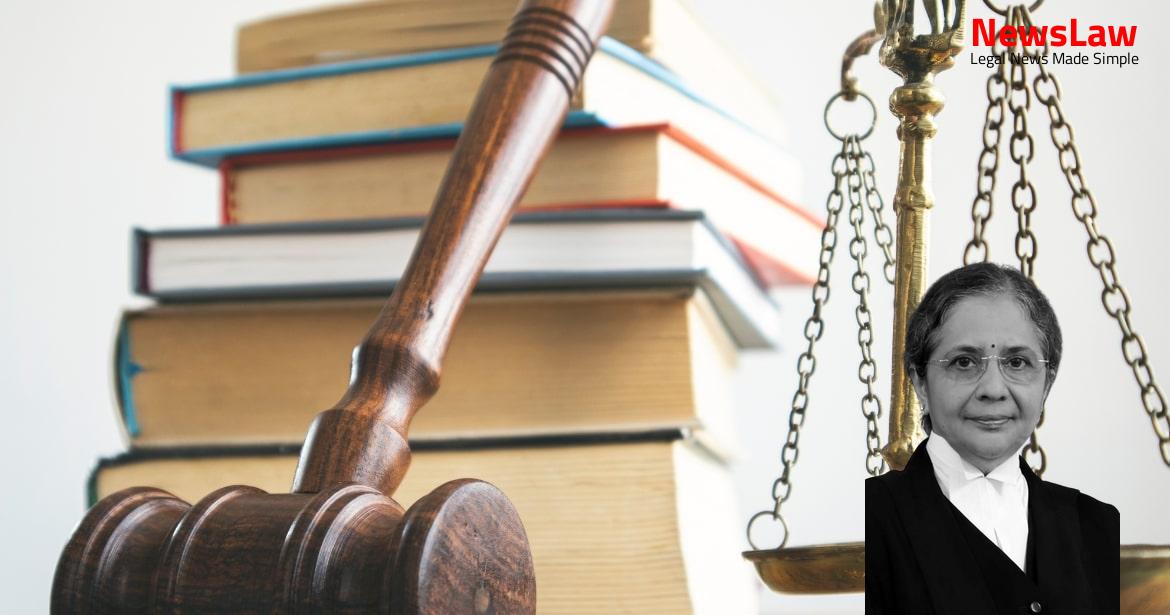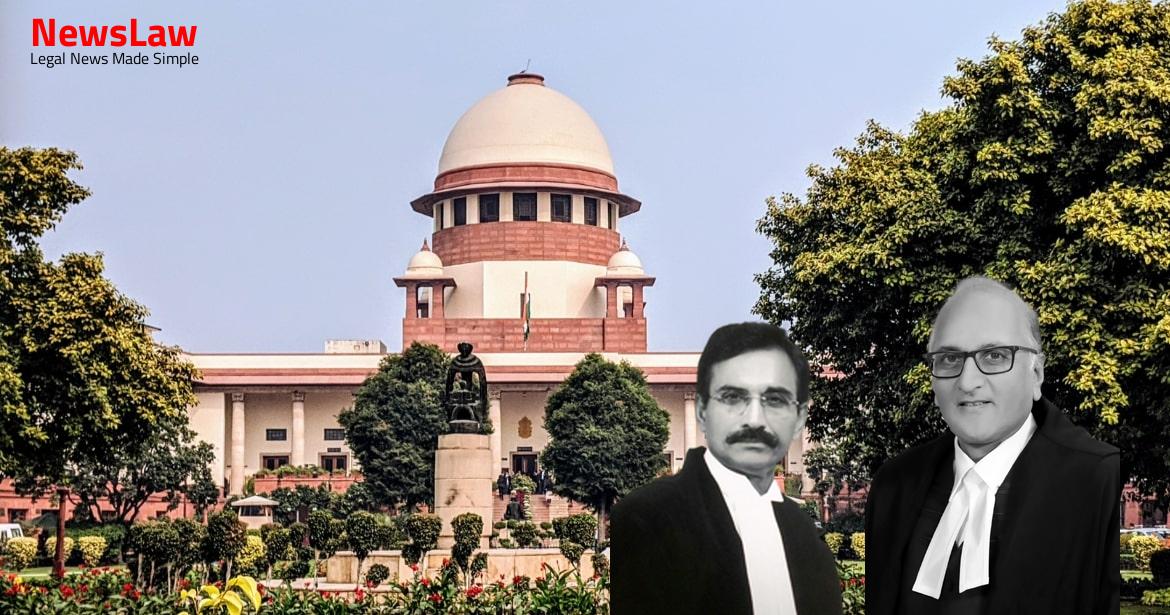Dive into the complexities of interpreting statutory regulations in a recent promotion dispute. The case delves into the precedence of statutory regulations over executive instructions, shedding light on the essentiality of upholding established laws in matters of promotion within statutory bodies. Discover the legal intricacies at play in balancing regulatory frameworks and administrative directives in this insightful analysis.
Facts
- ESIC in appeal against Karnataka High Court judgment
- CAT ruling that ESIC Recruitment Regulations 2015 not relevant
- High Court dismissal based on DACP Scheme benefit for pre-2015 recruited respondents
- DACP Scheme with statutory effect under Section 17 of ESI Act
- ESIC is a statutory body established under the Employees’ State Insurance Act 1948.
- CAT directed ESIC to consider the contesting respondents for promotion under the DACP Scheme.
- Recruitment and promotion of teaching staff at ESIC are governed by the Employees’ State Insurance Corporation (Medical Teaching Faculty Posts) Recruitment Regulations 2015.
- Contesting respondents sought promotion under the DACP Scheme after completing two years of service as Assistant Professors.
- The Central Government issued the DACP Scheme through an Office Memorandum dated 29 October 2008.
- Contesting respondents joined ESIC as Assistant Professors between 7 February 2012 and 26 June 2014.
- The High Court of Karnataka rejected the appellant’s petition against the promotion of the contesting respondents to the post of Associate Professor under the DACP Scheme.
Also Read: Electoral Malpractices in Mayor Election
Arguments
- The appellant is an autonomous statutory corporation under the ESI Act.
- The DACP Scheme does not override or supersede statutory regulations under the ESI Act.
- ESIC has the power to frame regulations under Section 97(3) of the ESI Act.
- ESIC Recruitment Regulations 2015 in regard to service conditions of contesting respondents cannot be ignored.
- The DACP Scheme is binding on the appellant as per Section 17(2)(a) of the ESI Act.
- ESIC Recruitment Regulations 2008 were issued without Central Government approval.
- Advertisements by appellant stated the DACP guidelines but not approved by Central Government.
- Office Memorandum dated 29 October 2008 on DACP Scheme is for Central Government employees only.
- Appellant estopped from denying DACP Scheme applicability due to recruitment advertisements.
- ESIC has administrative control under the Ministry of Labor and Employment.
Also Read: Balancing Power and Transparency: Electoral Bonds Struck Down, Disclosure Mandated
Analysis
- The qualifying service of five years under the ESIC Recruitment Regulations 2015 should be reasonably interpreted, and cumulative experience of more than five years deemed sufficient for promotion.
- Regulations prevail over advertisements if inconsistent, as per precedents in Malik Mazhar Sultan v. UPSC, Ashish Kumar v. State of UP, and Raminder Singh v. State of Punjab.
- The DACP Scheme’s applicability to non-teaching staff of ESIC is irrelevant as the ESIC Recruitment Regulations 2015 govern ‘Medical Teaching Faculty Posts’.
- The advertisements mentioning DACP Scheme applicability for recruits does not supersede statutory regulations, as established in Sukhdev Singh v. Bhagatram Sardar Singh Raghuvanshi.
- ESIC Recruitment Regulations 2015 were approved by the Central Government, as per the preamble, contradicting the High Court’s incorrect recording.
- In case of a conflict, statutory regulations take precedence over executive instructions or office memorandums, as highlighted in Sant Ram Sharma v. State of Rajasthan.
- Contesting respondents seeking promotion should be considered under the DACP Scheme based on their teaching experience, supported by precedents like State of UP v. Mukesh Narain and B L Gupta v. MCD.
- The DACP Scheme’s implementation for doctors and medical staff in the Central Government was upheld in State of Uttar Pradesh v. U.P. Rajya Khanij Vikas Nigam Sangharsh Samiti.
- Erroneous advertisements do not create legal rights, as clarified in Malik Mazhar Sultan v. U.P. Public Service Commission, thereby emphasizing the importance of following recruitment rules over misleading advertisements.
- The ESIC Recruitment Regulations 2008 and 2015 have statutory effect under Section 97(3) of the ESI Act.
- Regulations framed by statutory authorities have the force of enacted law.
- The controversy in the appeal arises from the interpretation of Section 17(2)(a) of the ESIC Act 1948.
- The DACP Scheme was extended to Medical and Dental Doctors in the Central Government through the Office Memorandum dated 29 October 2008.
- Section 17 of the ESI Act empowers ESIC to frame regulations.
- The ESIC Recruitment Regulations 2008 were issued under Section 97(1) and Section 17(3) of the ESI Act.
- The dispute revolves around the applicable regulations for promotion – ESIC Recruitment Regulations 2008, DACP Scheme, or ESIC Recruitment Regulations 2015.
- The regulations introduced the Specialist (Teaching) cadre in ESIC and governed appointments to teaching faculty posts in ESIC Medical Colleges.
- The appellants did not challenge the ESIC Recruitment Regulations 2008 or 2015 before the CAT or High Court.
- The DACP Scheme is applicable for claiming promotion as Associate Professor after two years of service according to the contesting respondents.
- Advertisements for recruitment mentioning the DACP Scheme would have no effect as they were in contravention of the applicable recruitment regulations.
- The argument on lack of prior approval as per Section 17(2) of the ESI Act is obviated by the preamble to the ESIC Recruitment Regulations 2015.
Also Read: Recall of Resolution Plan Approval: Legal Analysis
Decision
- The revised seniority list of the Teaching Cadre at the appellant corporation should reflect promotions of the contesting respondents as per ESIC Recruitment Regulations 2015 and not the DACP Scheme.
- The appeal is allowed, and the impugned judgment and order of the Division Bench of the Karnataka High Court dated 5 September 2019 are set aside.
- The appeal is disposed of accordingly.
- Pending application(s), if any, shall stand disposed of.
Case Title: THE EMPLOYEES STATE INSURANCE CORPORATION Vs. UNION OF INDIA (2022 INSC 77)
Case Number: C.A. No.-000152-000152 / 2022



